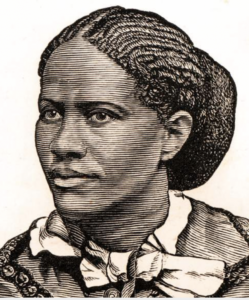I ask no monument, proud and high,
To arrest the gaze of the passers-by;
All that my yearning spirit craves,
Is bury me not in a land of slaves.
INTRODUCTION

Frances Ellen Watkins Harper (1825-1911) was one of the most prolific black writers, poets and activists of nineteenth-century America. She was born free in Maryland in 1825 but orphaned at a young age and raised by her aunt and uncle. Harper began publishing poetry in her early 20s. By the 1850s, she had become a leading abolitionist poet and lecturer, based mostly in Philadelphia. She worked closely with William Still, a leader of the Philadelphia Vigilance Committee which coordinated Underground Railroad activities in the region. During the Civil War, Harper married and raised a family in Ohio. After the war, she became involved in a number of reform movements and continued her career as a writer. This poem, “Bury Me in a Free Land,” originally appeared in an abolitionist newspaper from Ohio, Anti-Slavery Bugle, on November 20, 1858, under the byline, Frances Ellen Watkins. The poet was 33-years-old. Harper, who died in 1911, was buried in a cemetery near Philadelphia.
SOURCE FORMAT: Poem
WORD COUNT: 246 words
RELATED TEXTS: Wheatley poem (1773) // Douglass Narrative (1845) // Popel poem (1934) // Gorman poem (2021)
CONTEXT LECTURE: Douglass and Abolitionism

Make me a grave where’er you will,
In a lowly plain, or a lofty hill;
Make it among earth’s humblest graves,
But not in a land where men are slaves.
I could not rest if around my grave
I heard the steps of a trembling slave;
His shadow above my silent tomb
Would make it a place of fearful gloom.
I could not rest if I heard the tread
Of a coffle gang to the shambles led,
And the mother’s shriek of wild despair
Rise like a curse on the trembling air.
I could not sleep if I saw the lash
Drinking her blood at each fearful gash,
And I saw her babes torn from her breast,
Like trembling doves from their parent nest.
I’d shudder and start if I heard the bay
Of bloodhounds seizing their human prey,
And I heard the captive plead in vain
As they bound afresh his galling chain.
If I saw young girls from their mother’s arms
Bartered and sold for their youthful charms,
My eye would flash with a mournful flame,
My death-paled cheek grow red with shame.
I would sleep, dear friends, where bloated might
Can rob no man of his dearest right;
My rest shall be calm in any grave
Where none can call his brother a slave.
I ask no monument, proud and high,
To arrest the gaze of the passers-by;
All that my yearning spirit craves,
Is bury me not in a land of slaves.

